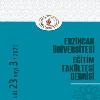Ortaokul Matematik Öğretmenlerinin Aritmetik ve Cebir Problemleri Hakkındaki Görüşleri ve İnançları
Opinions and Beliefs of Middle School Mathematics Teachers about Arithmetic and Algebra Problems
___
- Akgün, L. (2006). Cebir ve değişken kavramı üzerine. Journal of Qafqaz University, 17(1). 25- 29.
- Akkan, Y. (2009). İlköğretim öğrencilerinin aritmetikten cebire geçiş süreçlerinin incelenmesi, Yayımlanmamış Doktora Tezi, Karadeniz Teknik Üniversitesi, Trabzon, Türkiye.
- Başol, G. (2015). Eğitimde ölçme ve değerlendirme, Ankara: Pegem Akademi
- Benckert, S. (1997). Context and conversation in physics education. http://www.nshu.se/ download/3018/benckert_sylvia_97.pdf adresinden alınmıştır.
- Büyüköztürk, Ş., Çakmak, E.K., Akgün, Ö.E., Karadeniz, Ş., & Demirel,F. (2013). Bilimsel araştırma yöntemleri. (17. baskı). Ankara: Pegem Akademi.
- Carpenter, T.P. & Levi, L. (2000). Developing conceptions of algebraic reasoning in the primary grades. 11.08.2008 tarihinde www.wcer.wisc.edu/ncisla /publications/ index.html. adresinden alınmıştır.
- Case, R. & Okamoto, Y. (1996). The role of central conceptual structures in the development of children’s thought, Monographs of the Society for Research in Child Development, 61(1–2, Serial No. 246).
- Cross, D. I. (2009). Alignment, cohesion, and change: Examining mathematics teachers’ beliefs structures and their influence on instructional practices. Journal Math Teacher Education, 12, 325 – 346.
- Gomez-Chacon, I. (2000). Affective influences in the knowledge of mathematics. Educational Studies in Mathematics 43, 149–168.
- Hersovics, N., & Linchevski, L. (1994). A cognative gap between arithmetic and algebra. Educational Studies in Mathematics, 27 (1), 59-78.
- Johnson, B. & Christensen, L. (2004). Educational research: Quantitative, qualitative and mixed approaches. Pearson Education, Inc., Second Edition, 562 p, Boston.
- Kieran, C. & Chalouh, L. (1993). Prealgebra: The transition from arithmetic to algebra. In P. S. Wilson (Ed.), Research ideas for the classroom: Middle grades mathematics, (pp. 119-139). New York: Macmillan.
- Kieran, C. (1992). The learning and teaching of school algebra. In D.A. Grouws (Ed.), Handbook of research on mathematics teaching and learning (pp. 390-419). New York: Macmillan.
- Koedinger, K.R., & Nathan, M.J. (2004). The real story behind story problems: Effects of representations on quantitative reasoning. The Journal of The Learning Sciences, 13(2), 129-164.
- Moss, J., & Case, R. (1999). Developing children’s understanding of the rational numbers: A new model and an experimental curriculum. Journal for Research in Mathematics Education, 30, 122–147.
- Nathan, M. J., & Koedinger, K. R. (2000a). An investigation of teachers’ beliefs of students’ algebraic development. Cognition and Instruction, 18, 209- 237.
- Nathan, M. J., & Koedinger, K. R. (2000b). Teachers’ and researcher’s beliefs about the development of algebraic reasoning. Journal for Research in Mathematics Education, 31(2), 168 -190.
- National Council of Teachers of Mathematics. (2000). Principles and standards for school mathematics. Reston, VA: NCTM.
- Riley, M. S., Greeno, J. G., & Heller, J. I. (1983). Development of children’s problem-solving ability in arithmetic. In H. P. Ginsburg (Ed.), The development of mathematical thinking (pp. 153– 196). New York: Academic Press.
- Sakellis, F.M. (2011). Teachers’ beliefs about students’ cognition from arithmetic to algebraic concepts. Unpublished doctoral dissertation, Wilmington University, US.
- Schoenfeld, A. H. (1998). Toward a theory of teaching-in-context. Issues in Education, 4, 1–94.
- Sherin, M. G. (2004). New perspectives on the role of video in teacher education. In J. Brophy (Ed.), Using video in teacher education (pp. 1–28). Amsterdam: Elsevier.
- Van De Walle, J. A., Karp, K. S. & Bay-Williams J. M. (2013). İlkokul ve ortaokul matematiği. S. Durmuş (Çev.). Ankara: Nobel Yayın Dağıtım.
- Yayın Aralığı: Yılda 4 Sayı
- Başlangıç: 1999
- Yayıncı: Erzincan Binali Yıldırım Üniversitesi
Boşlukları Doldurunuz: Öğrenciler Okulda ... Oynamak İstiyor
Otizmli Çocukların Eğitiminde Robot Yardımcılar: Robot ve Çocuk Arasındaki Etkileşim
İlkokul Birinci Sınıf Öğrencilerinin Dik Temel Yazı ile Kelime Yazım Hatalarının İncelenmesi
Boşlukları Doldurunuz: Öğrenciler Okulda ……… Oynamak İstiyor
Ortaokul Matematik Öğretmenlerinin Aritmetik ve Cebir Problemleri Hakkındaki Görüşleri ve İnançları
Mesut ÖZTÜRK, Betül Küçük DEMİR, Pınar AKKAN, Yaşar Akkan
Okul Öncesi Öğretmen Adaylarının FeTeMM Farkındalıklarının Değerlendirilmesi
Zeynep DERE, Zeynep KOYUNLU ÜNLÜ
Temel Geometri Kavramlarına İlişkin Matematik Öğretmen Adaylarının Genel Alan Bilgisi
Ortaokul Matematik Öğretmenlerinin Aritmetik ve Cebir Problemleri Hakkındaki İnanışları
Yaşar AKKAN, Mesut ÖZTÜRK, Pınar AKKAN, Betül KÜÇÜK DEMİR
Resim İş Öğretmenliği Öğrencilerinin Sanatsal Yaratım Süreçleri
